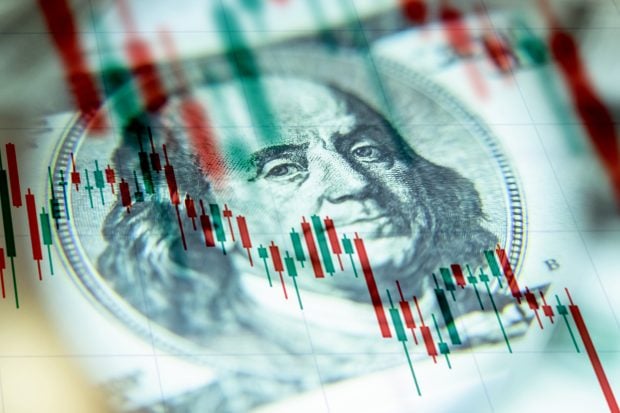The economy grew from spring to summer, but CUNA and others warn of what's ahead.
By Jim DuPlessis | October 27, 2022 CUTimes
 Source: AdobeStock.
Source: AdobeStock.
The U.S. economy rebounded in the third quarter after two quarters of small declines, but the happy music might be ending soon.
The U.S. Bureau of Economic Analysis on Thursday reported that real gross domestic product (GDP) increased at a seasonally adjusted annual rate of 2.6% from the second quarter to the third quarter.
The gain reflected improvements in exports, consumer spending, nonresidential fixed investment and government spending. Reducing GDP were decreases in residential fixed investment and private inventory investment.
CUNA Chief Economist Mike Schenk said the rebound was solid, but “widely expected.” CUNA’s baseline economic forecast called for the economy to grow by 2.5% in the third quarter and the consensus estimate among economists was 2.3%.
“Healthy economic growth will not last,” Schenk said. “The Federal Reserve’s recent aggressive policy response to stubbornly high inflation virtually guarantees that fourth-quarter output will decelerate — perhaps significantly.”
 Mike Schenk
Mike Schenk
By raising the federal funds rate sharply this year, Schenk said the Fed has raised the cost of homes, autos, and other big-ticket items purchased on credit.
“Spending and borrowing will therefore undoubtedly take a big hit in the fourth quarter,” he said. “The end result will be obvious and impactful labor market dislocations.”
Prices for goods and services bought by consumers rose at a seasonally adjusted annual rate of 4.2% from the second quarter to the third quarter. The Personal Consumption Expenditures (PCE) Price Index gain fell from a 7.3% increase in the second quarter and a peak of 7.5% in the first quarter.
“Overall, this was exactly the type of report the Federal Reserve is looking for,” NAFCU Chief Economist Curt Long said. “Rate-sensitive areas are responding to tightening monetary policy, but the rest of the economy is moderating more slowly.”
 Curt Long
Curt Long
“It is still too early for the FOMC to think about a pivot, but after next week’s 75 basis-point hike, this report would support a mild step down to a 50-point increase in December,” Long said.
Economists from the Mortgage Bankers Association on Oct. 23 predicted a recession in early 2023. On Thursday, MBA Deputy Chief Economist Joel Kan said the third-quarter GDP gain hasn’t derailed its prediction.
“Despite a strong third quarter result, our forecast is for a slowdown in economic growth in the coming quarters and for the economy to enter a recession in 2023,”
 Joel Kan
Joel Kan
“Sharp slowdowns in global growth and tighter financial conditions have started to exert pressure on parts of the economy, in particular housing,” he said. “There are also early signs of weakening in the job market, such as slower monthly payroll growth and declining job openings.”
On Thursday, MBA reported that homebuyer affordability dropped in September. The national median payment applied for by mortgage applicants increased 5.5% to $1,941 from $1,839 in August. It is up by $558 in the first nine months of the year, equal to a 40.4% increase.
MBA’s Oct. 23 forecast showed purchase originations in the third quarter were $388 billion, down 22% from a year earlier.
MBA’s also made sharp downward revisions over the next nine quarters. It expects purchase originations to fall 29% to $340 billion in the fourth quarter and fall 3% to $1.53 trillion next year.
Kan said Thursday’s GDP report showed residential investment declined for the sixth straight quarter, subtracting 1.37 percentage points from GDP growth, the largest drag since 2007.
Home purchase applications, home sales, and housing starts “showed significant weakening last quarter as mortgage rates reached multi-decade highs and as economic uncertainty grew,” he said.
The 2.6% gain in GDP from the second quarter to the third quarter follows dips of 1.6% in the first quarter and 0.6% in the second quarter. GDP took a record 29.9% plunge in the second quarter of 2020 as the COVID-19 pandemic began, followed a record surge of 35.3% in the following quarter. GDP continued growing at more normal rates through 2021’s fourth quarter.
Some other key measures from the BEA report include:
Thursday’s “advance” estimate will be followed by a second estimate based on more complete data to be released Nov. 30.
Jim DuPlessis
By Jim DuPlessis | October 27, 2022 CUTimes
 Source: AdobeStock.
Source: AdobeStock. The U.S. economy rebounded in the third quarter after two quarters of small declines, but the happy music might be ending soon.
The U.S. Bureau of Economic Analysis on Thursday reported that real gross domestic product (GDP) increased at a seasonally adjusted annual rate of 2.6% from the second quarter to the third quarter.
The gain reflected improvements in exports, consumer spending, nonresidential fixed investment and government spending. Reducing GDP were decreases in residential fixed investment and private inventory investment.
CUNA Chief Economist Mike Schenk said the rebound was solid, but “widely expected.” CUNA’s baseline economic forecast called for the economy to grow by 2.5% in the third quarter and the consensus estimate among economists was 2.3%.
“Healthy economic growth will not last,” Schenk said. “The Federal Reserve’s recent aggressive policy response to stubbornly high inflation virtually guarantees that fourth-quarter output will decelerate — perhaps significantly.”
 Mike Schenk
Mike Schenk By raising the federal funds rate sharply this year, Schenk said the Fed has raised the cost of homes, autos, and other big-ticket items purchased on credit.
“Spending and borrowing will therefore undoubtedly take a big hit in the fourth quarter,” he said. “The end result will be obvious and impactful labor market dislocations.”
Prices for goods and services bought by consumers rose at a seasonally adjusted annual rate of 4.2% from the second quarter to the third quarter. The Personal Consumption Expenditures (PCE) Price Index gain fell from a 7.3% increase in the second quarter and a peak of 7.5% in the first quarter.
“Overall, this was exactly the type of report the Federal Reserve is looking for,” NAFCU Chief Economist Curt Long said. “Rate-sensitive areas are responding to tightening monetary policy, but the rest of the economy is moderating more slowly.”
 Curt Long
Curt Long “It is still too early for the FOMC to think about a pivot, but after next week’s 75 basis-point hike, this report would support a mild step down to a 50-point increase in December,” Long said.
Economists from the Mortgage Bankers Association on Oct. 23 predicted a recession in early 2023. On Thursday, MBA Deputy Chief Economist Joel Kan said the third-quarter GDP gain hasn’t derailed its prediction.
“Despite a strong third quarter result, our forecast is for a slowdown in economic growth in the coming quarters and for the economy to enter a recession in 2023,”
Kan said.
 Joel Kan
Joel Kan“Sharp slowdowns in global growth and tighter financial conditions have started to exert pressure on parts of the economy, in particular housing,” he said. “There are also early signs of weakening in the job market, such as slower monthly payroll growth and declining job openings.”
On Thursday, MBA reported that homebuyer affordability dropped in September. The national median payment applied for by mortgage applicants increased 5.5% to $1,941 from $1,839 in August. It is up by $558 in the first nine months of the year, equal to a 40.4% increase.
MBA’s Oct. 23 forecast showed purchase originations in the third quarter were $388 billion, down 22% from a year earlier.
MBA’s also made sharp downward revisions over the next nine quarters. It expects purchase originations to fall 29% to $340 billion in the fourth quarter and fall 3% to $1.53 trillion next year.
Kan said Thursday’s GDP report showed residential investment declined for the sixth straight quarter, subtracting 1.37 percentage points from GDP growth, the largest drag since 2007.
Home purchase applications, home sales, and housing starts “showed significant weakening last quarter as mortgage rates reached multi-decade highs and as economic uncertainty grew,” he said.
The 2.6% gain in GDP from the second quarter to the third quarter follows dips of 1.6% in the first quarter and 0.6% in the second quarter. GDP took a record 29.9% plunge in the second quarter of 2020 as the COVID-19 pandemic began, followed a record surge of 35.3% in the following quarter. GDP continued growing at more normal rates through 2021’s fourth quarter.
Some other key measures from the BEA report include:
- Third-quarter GDP was 1.8% greater than GDP in 2021’s third quarter after adjusting for inflation.
- Real disposable personal income increased 1.7% from the second quarter to the third quarter, in contrast to a decrease of 1.5% in the second quarter a 10.6% drop in the first quarter. It had been falling quarter to quarter since the third quarter of 2020.
- The personal saving rate—personal saving as a percentage of disposable personal income—was 3.3% in the third quarter, compared with 3.4% in the second quarter.
- The price index for gross domestic purchases increased 4.6% in the third quarter, compared with an increase of 8.5% in the second quarter.
Thursday’s “advance” estimate will be followed by a second estimate based on more complete data to be released Nov. 30.
Jim DuPlessis
Comments
Post a Comment
Please no profanity or political comments.